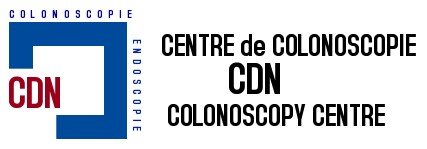At CDN Colonoscopy - GASTROSCOPY CENTRE, we offer two gastrointestinal procedures, colonoscopy and gastroscopy, as well as private gastroenterology consultations by gastroenterologist, Dr. Seymour Blum.
COLONOSCOPY
A colonoscopy is a test in which a colonoscope, (a long flexible tube) is inserted through the rectum in the large intestine. It allows the physician to examine the lining of the intestine and evaluate small abnormalities that would not have been detected by x-ray. If the doctor feels a suspicious area needs greater evaluation, a small piece of tissue (a biopsy) can be taken for examination in the laboratory.
During the colonoscopy, abnormal growths (polyps) may be detected. These are usually removed because they can bleed or contain cancerous cells. To remove the polyp, your doctor will insert a wire loop (snare) through the colonoscope and remove the polyp, using an electrical device. This procedure is generally painless. The majority of polyps are benign, but removing polyps is an important way of preventing colon cancer. This procedure is usually well tolerated and many patients fall asleep during the examination. In some cases, it is impossible to pass the colonoscope to examine the entire colon. If that was to occur, the doctor will discuss other alternatives with you.
After the colonoscopy, you will remain in the endoscopy area until the effects of the medications have sufficiently worn off. You may also feel bloated from the air that was introduced in your intestine during the examination. When you leave the clinic, you will be able to resume your usual diet.
GASTROSCOPY
A gastroscopy is a test in which a gastroscope (a long flexible tube) is passed through the mouth and back of your throat into the upper digestive tract. It allows the physician to examine the lining of the esophagus, stomach and duodenum (the first portion of the small intestine). During the gastroscopy, if the doctor feels a suspicious or inflamed area needs greater evaluation, the doctor may take a small piece of tissue (a biopsy) to be analyzed in the laboratory. A gastroscopy is also often used to control bleeding.
Many problems of the upper digestive tract cannot be diagnosed accurately by x-ray. Included are inflammation of the esophagus, stomach and duodenum, and many causes of gastrointestinal bleeding. This technique is more accurate in detecting ulcers and cancers than x-rays. It allows for biopsies, cultures and stretching of narrowed areas.
Your doctor may give you medication through a vein to make you relaxed and comfortable, and your throat may be sprayed with a local anesthetic. The procedure is extremely well tolerated with little or no discomfort. You may fall asleep during the procedure. The tube will not interfere with your breathing. Gagging is usually prevented by the medication.
PRIVATE GASTROENTEROLOGY CONSULTATION
Private gastroenterologist MD who will work with you to review your medical history, discuss current symptoms in order to provide diagnosis and other investigations (if needed). No referral necessary for any stomach / abdominal issues such as:
Abdominal / Stomach Pain
Rectal Bleeding
Chronic Nausea
Vomiting
Diarrhea

